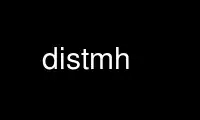
This is the command distmh that can be run in the OnWorks free hosting provider using one of our multiple free online workstations such as Ubuntu Online, Fedora Online, Windows online emulator or MAC OS online emulator
PROGRAM:
NAME
dist - redistribute a message to additional addresses
SYNOPSIS
dist [+folder] [msg] [-form formfile] [-annotate | -noannotate] [-inplace | -noinplace]
[-draftfolder +folder] [-draftmessage msg] [-nodraftfolder] [-editor editor]
[-noedit] [-width columns] [-from address] [-to address] [-cc address] [-fcc +folder]
[-whatnowproc program] [-nowhatnowproc] [-atfile] [-noatfile] [-version] [-help]
DESCRIPTION
Dist is similar to forw. It prepares the specified message for redistribution to
addresses that (presumably) are not on the original address list.
The default message form contains the following elements:
Resent-From: {from switch} or <Local-Mailbox> or <username@hostname>
Resent-To: {to switch} or blank
Resent-cc: {cc switch} or blank
Resent-fcc: {fcc switch} or blank
If a file named “distcomps” exists in the user's nmh directory, it will be used instead of
this default form. You may specify an alternate forms file with the switch -form
formfile. Forms are processed via the nmh template system; see mh-format(5) for details.
Components from the redistributed message are available as standard component escapes in
the forms file.
In addition to the standard mh-format(5) escapes, the following component escapes are also
supported:
Escape Returns Description
fcc string Any folders specified with `-fcc folder'
nmh-from string Addresses specified with `-from address'
nmh-to string Addresses specified with `-to address'
nmh-cc string Addresses specified with `-cc address'
See the forw(1) man page for descriptions of the -from, -to, -cc, and -fcc switches.
If the draft already exists, dist will ask you as to the disposition of the draft. A
reply of quit will abort dist, leaving the draft intact; replace will replace the existing
draft with a blank skeleton; and list will display the draft.
Only those addresses in “Resent-To:”, “Resent-cc:”, and “Resent-Bcc:” will be sent. Also,
a “Resent-Fcc: folder” will be honored (see send(1)). Note that with dist, the draft
should contain only “Resent-xxx:” fields and no body. The headers and the body of the
original message are copied to the draft when the message is sent. Use care in
constructing the headers for the redistribution.
Because the draft is minimal, the prompter(1) editor is quite useful with dist.
If the -annotate switch is given, the message being distributed will be annotated with
the lines:
Resent: date
Resent: addrs
where each address list contains as many lines as required. This annotation will be done
only if the message is sent directly from dist. If the message is not sent immediately
from dist, “comp -use” may be used to re-edit and send the constructed message, but the
annotations won't take place. Normally annotations are done inplace in order to preserve
any links to the message. You may use the -noinplace switch to change this.
See comp(1) for a description of the -editor and -noedit switches. Note that while in the
editor, with -atfile and if the current directory is writable, the message being resent is
available through a link named “@” (assuming the default whatnowproc). In addition, the
actual pathname of the message is stored in the environment variable $editalt, and the
pathname of the folder containing the message is stored in the environment variable
$mhfolder. The creation of the “@” file is controlled via the -atfile and -noatfile
options.
The -draftfolder +folder and -draftmessage msg switches invoke the nmh draft folder
facility. This is an advanced (and highly useful) feature. Consult the mh-draft(5) man
page for more information.
Upon exiting from the editor, dist will invoke the whatnow program. See whatnow(1) for a
discussion of available options. The invocation of this program can be inhibited by using
the -nowhatnowproc switch. (In truth of fact, it is the whatnow program which starts the
initial edit. Hence, -nowhatnowproc will prevent any edit from occurring.)
Use distmh online using onworks.net services
